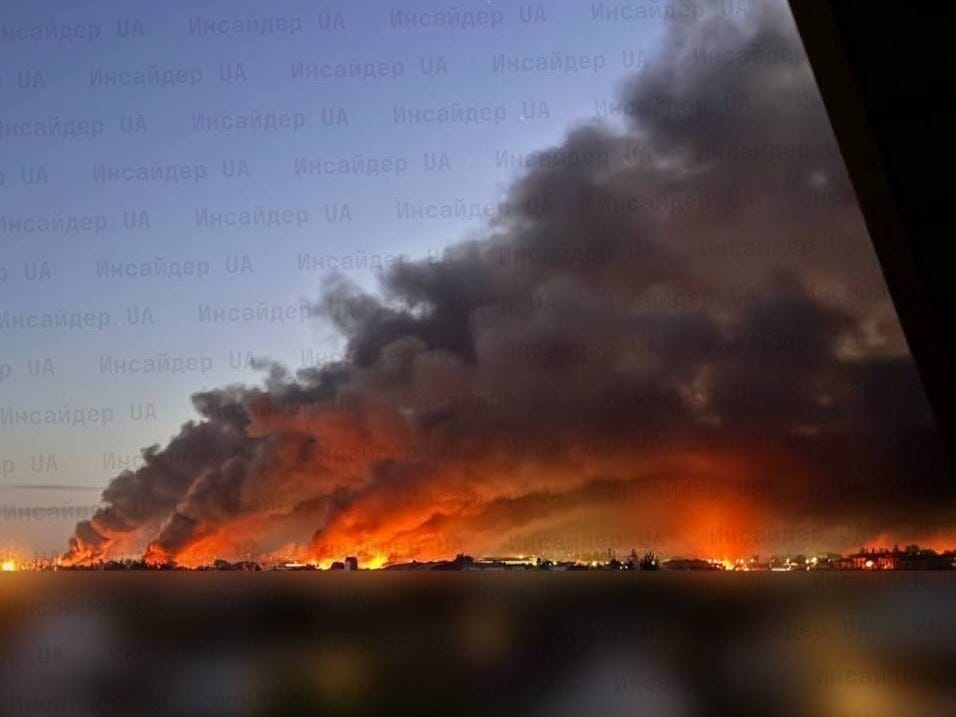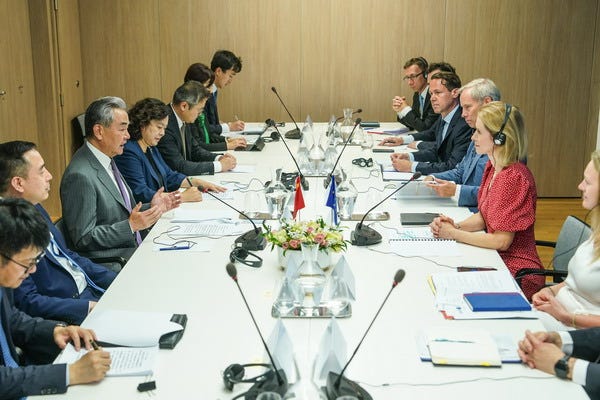Weekly Significant Activity Report - July 5, 2025
Russia launches largest ever air assaults on Ukraine, China shocks Europe with intention to support Russian victory, relations between Azerbaijan and Russia rapidly deteriorate
This week's analysis highlights some of the most significant news concerning America's adversaries between June 28 - July 5, 2025.
Summary:
Russia launches the largest air assaults of the war this week and signals it is not interested in US mediation.
China’s Foreign Minister shocks European diplomats with the admission that China wants the war in Ukraine to continue and Russia to ultimately win.
Moscow and Baku engage in an escalating feud which has led to dozens of arrests, and the expulsion of Russian-state media from Azerbaijan.
Russian aggression further strains arms control conventions governing land mines and chemical weapons.
New reporting suggests that North Korea may be planning to dramatically increase the number of troops it has supporting Russia’s war.
1. RUSSIA ESCALATES AIR ASSAULTS IN UKRAINE AS IT REBUFFS THE US
Russia Launches Two of the Largest Air Strikes of the War This Week
This week Russia launched several of the largest long-range drone and missile barrages in over three years of war on Ukrainian cities.
June 28 - 29: Russian attack consists of 447 drones (including decoys), 14 ballistic missiles, and 46 cruise missiles.
July 3 - 4: Russian attack consists of 539 drones (including decoys), and 10 ballistic missiles.
Polish Foreign Minister Radosław Sikorski announced that a Russian drone strike damaged the consular section of the Polish Embassy in Kyiv during the July 3 attack. Ukrainian Foreign Minister Andrii Sybiha alleged that the evenings strikes also caused damage to the Chinese consulate in Odesa.

Putin Tells Trump that Russia Will Not End War Until Ukraine Capitulates
Russian President Vladimir Putin declared that Russia would not stop fighting in Ukraine until its strategic aims were achieved in a July 3 phone call with US President Donald Trump. Top Putin aide Yuri Ushakov repeated Putin’s claim that,
“Russia would strive to achieve its goals, namely the elimination of the well-known root causes that led to the current state of affairs, the bitter confrontation that we are seeing now. Russia will not back down from these goals.”
Russia Recognizes the Taliban as Government of Afghanistan
On July 3, the Russian Foreign Ministry officially recognized the Taliban as the government of Afghanistan. Russia is the first country to officially recognize the Taliban as legitimate rulers of the country.
Takeaways:
Russian air assaults on Ukrainian cities have grown in intensity due to rapid development of Russia’s drone industry. Russia has adapted its own model of the Iranian Shahed drone, whose technology the Iranian Air Force transferred to Moscow in the summer of 2022. The Russian model, also known as the Geran, is cheaper and faster to produce than missiles, costing around $35,000. Iterative refinements in the drone’s technology are making them increasingly difficult for Ukrainian air defenses to intercept.
Russia has significantly ramped up its production of Shahed drones, and may soon be able to regularly conduct attacks at the present intensity. Ukraine has alleged that rapid gains in Russia’s drone production have come as a result of close collaboration with Chinese manufacturers. Recent reports suggest North Korea is also bolstering Russian drone production by supplying thousands of North Korean laborers to work in Russian factories in Tatarstan.
Putin's rejection of US mediation and revival of the Imperial Russian term "Novorossiya" signal his maximalist war aims. This negotiating position likely reflects confidence that intensifying drone and missile strikes will exhaust Ukrainian defenses, break civilian morale, and force capitulation as Russian forces advance eastward.
Russia’s recognition of the Taliban came three days after the White House announced that it would lift sanctions on Syria. Recognition of the Taliban is likely a symbolic response to a growing normalization of relations between Syria and the US and after the country’s current rebel-led government toppled Russia’s patron Bashar al-Assad. The move implies that despite the occasionally warm words Putin shares with Trump, the Kremlin will continue a fundamentally adversarial relationship with the US.
2. CHINA TELLS EUROPE THAT IT WANTS THE WAR IN UKRAINE TO CONTINUE
In a July 2 meeting with Kaja Kallas, the High Representative for Foreign Affairs and Security Policy for the European Union (EU), China’s Foreign Minister Wang Yi stated that China cannot afford for Russia to lose the war in Ukraine. Wang implied that China had an interest in the war continuing to keep the US from dedicating its entire focus to the Indo-Pacific region. The remarks came during the 13th round of high-level strategic dialogue between China and the EU ahead of next week’s China-EU summit.

Takeaways:
Wang Yi's remarks represent a major strategic error. While he likely intended to candidly explain China's tacit support for Russia as serving broader national interests, he gravely underestimated the existential fears of Russian invasion that prevail throughout much of Europe. Given Russia's brutal conduct and menacing threats toward Europe, China's position appears not merely contrary to European interests but deeply threatening.
Wang Yi's admission that China wants Russia to win the war becomes even more offensive when coupled with the implication that China's chief concern is creating conditions for East Asian dominance. By suggesting that European instability serves Chinese interests, Wang inadvertently established a compelling European interest in countering Chinese hegemony.
The statements, which China’s Foreign Ministry attempted to clarify on July 4, have helped upend what were warming ties between the EU and China. Beijing subsequently shortened an upcoming EU-China leaders summit at the end of July after Wang Yi’s remarks were leaked.
3. SIMMERING TENSIONS BETWEEN RUSSIA AND AZERBAIJAN BOIL OVER
Russia and Azerbaijan Arrest Scores of Each Other’s Citizens
Over the past week, Azerbaijan and Russia have engaged in tit-for-tat arrests of each other’s citizens. The feud was ignited after a June 27 raid by Russia’s Federal Security Service (FSB) in the city of Yekaterinburg resulted in the deaths of two Azerbaijani nationals. Baku claims that an autopsy revealed that the men were not killed during the FSB raid itself, as Moscow contends, but from wounds sustained from beatings they received in police custody. Since then both Azerbaijan and Russia have rounded up suspected organized crime figures, as well as the executives of the Azerbaijani branch of Russian state-media outlet Sputnik. Photos and video of the arrests and arraignments in both countries show the suspects subjected to especially rough treatment.

Azerbaijan Claims Kremlin Ordered the December 2024 Shoot Down of Azerbaijani Airliner.
On July 1, Azerbaijani Russian language media outlet, Minval Politika, published what it claims is evidence of Kremlin complicity in the December 25, 2024 downing of Azerbaijan Airlines Flight 8243. The evidence, a letter from a low-level Russian air defenses artillery officer, asserts that the order to shoot down the flight came directly from the Russian Defense Ministry. The flight from Baku to Grozny was struck by a Russian Pantsir-S missile and crashed near Aktau, Kazakhstan, killing 38 passengers and crew.
Takeaways:
The feud between Azerbaijan and Russia has been slowly building since the downing of Azerbaijan Airlines Flight 8243. Baku has been particularly indignant that Vladimir Putin failed to acknowledge Russia’s responsibility for the accident.
The aircraft downing and police raids, combined with growing influence of Russian ethno-nationalists, reinforce longstanding Azerbaijani suspicions that Russia views Azeris and other Turkic and Central Asian peoples as inferior. The brutality Russia has displayed in Ukraine has exacerbated concerns about how the country will treat Azeris in the future.
Azerbaijan’s assertiveness reflects a growing confidence in its national power. Azerbaijan, while a small state, enjoys outsized strategic advantages due to its alliance with Turkey, military cooperation with Israel and the US, its large diaspora, and commanding position along the Trans-Caspian “Middle Corridor” Trade Route.
4. RUSSIAN AGGRESSION IS THREATENING INTERNATIONAL CONVENTIONS ON LANDMINES AND CHEMICAL WEAPONS
Ukraine and Other Russian Neighbors Exit the Ottawa Convention
On June 29, Ukrainian President Volodymyr Zelensky signed a decree withdrawing Ukraine from the 1997 Ottawa Convention prohibiting the production and use of anti-personnel mines. Ukraine’s exit from the treaty follows similar actions by its neighbors to exit the treaty to prepare to defend against a Russian invasion.
On April 16, Latvia became the first of Russia’s neighbors to leave the Ottawa Convention.
On June 19, Finland’s parliament voted to exit the Ottawa Convention.
On June 26, Poland’s Sejm (lower house of parliament) overwhelmingly approved a plan to exit the treaty.
On June 27, Lithuania and Estonia formally submitted notice to the United Nations that it was exiting the Ottawa Convention.
Russian Military Routinely Using Chemical Weapons in Ukraine
This week the leaders of the Dutch and German intelligence agencies jointly announced that Russia now regularly uses prohibited chemical weapons in Ukraine. The intelligence chiefs alleged that the use of chemical irritants such as chloropicrin and tear gas to force Ukrainian soldiers from trenches and fortified positions has become “standardized and commonplace” in the Russian military. Dutch Defense Minister Ruben Brekelmans claims that Russia’s use of chloropicrin, a gas commonly used in World War I, has killed at least three Ukrainian soldiers and wounded 2,500.
Takeaways:
While proponents of international law are bewildered by the exit of Ukraine, Poland and the Baltic states from the Ottawa Convention, their continued adherence to a treaty that Russia is neither a signatory to, nor observes, made little sense. Russia has employed at least seven different types of anti-personnel mines on Ukrainian territory since the start of the war.
Russia has begun to rely heavily on dismounted infantry assaults due to their simplicity and ability to penetrate the vast anti-tank mine fields that have been assembled on the front lines and pose a serious obstacle to the country’s diminished stock of combat vehicles. Anti-personnel mines are an increasingly appealing means of defeating these repeated “meat wave” attacks, by making anti-tank mine fields harder to remove or navigate on foot.
Russia's use of choking agents clearly violates international norms and threatens the integrity of chemical weapons arms control. As with anti-personnel mines, the tactical advantages Russia gains from these weapons will likely incentivize reciprocal use. However, the deployment of chloropicrin does not necessarily signal Russia's intent to escalate to more lethal chemical weapons like nerve agents.
5. UKRAINE ANTICIPATES MASSIVE NEW DEPLOYMENT OF NORTH KOREAN TROOPS
This week Ukrainian intelligence officials reported that they believe a new deployment of as many as 25,000-30,000 North Korean troops may enter combat in late July or August.
Takeaways:
30,000 new North Korean troops would triple the number of combat troops the country has committed to Russia’s war effort.
Read this week’s Situation Report, where Co-Chair of the North Korea Economic Forum at George Washington University, Troy Stangarone, discusses this and other developments in the evolving strategic partnership between North Korea and Russia.




